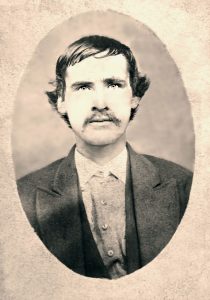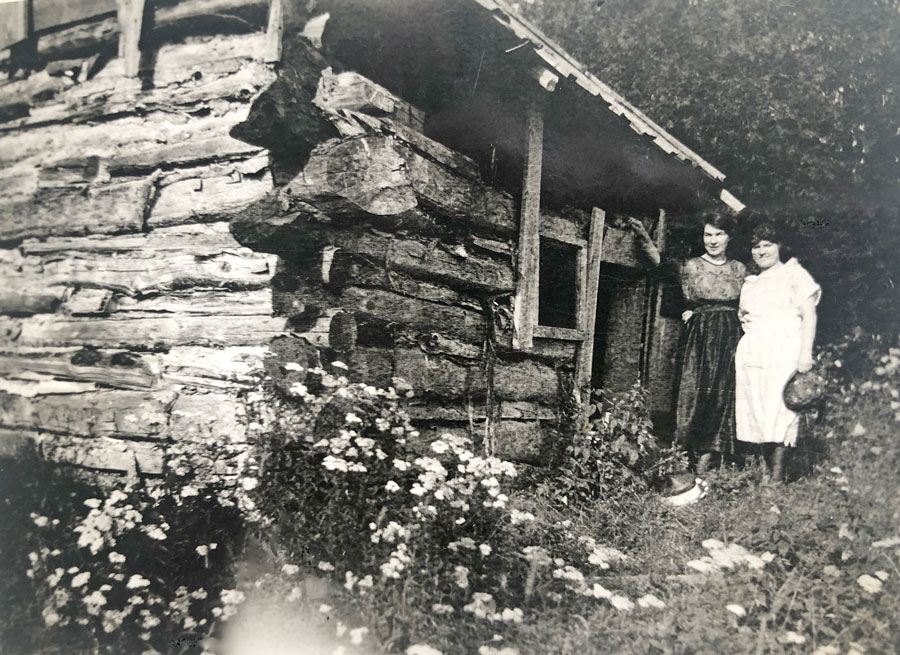Thanks to the biography that “Tot” Whitten Tate wrote about her mother, Rachel Marion Gibson Whitten, we now know a relatively detailed history of our Gibson family.
The actual nine page handwritten account is available in “Tater Roots” 1978 by Jane Murphy Thomas. Below is the word-for-word typed edition. Marion’s first name was Rachel, but was always known as Marion. She was named after her grandmother Rachel Broadfoot.
Marion’s personal accounts were as she quoted and were not altered for this article. Tracking the family and the events were remarkable. A story of an early immigrant family from the Old Country and their path to eventually selecting Minto for their home. This is part of our history that we may reflect upon.
Unfortunate that the resting places of the Gibson soldiers of the Civil War do not have a marker to indicate their participation to abolish slavery.
These words from Marion were taken over two sit down sessions near the end of her life in 1943.
I was born in the little village of Lochhill, Ayrshire, Scotland on Oct. 20, 1855 and baptized in the Parish of Kirkmichael. When I was 18 months old, my mother Mary took very ill and died due to blood poisoning.
In 1859 my father David Gibson, my sister Mary and brothers Will (Wm) and Alex left for the USA with my grandmother Rachel Broadfoot. We sailed on the Old Manhattan from Greenock, Scotland to Liverpool, England then left the old country shore bound for Ohio on a six-week Atlantic voyage docking in New York, USA. Some of my father’s family, his brother John and family, sisters Rachel and Jean, wife of Samuel Neil, had immigrated a few years before us and settled in Ohio.
I was only two, but somehow remember the boat going side to side and spilling the eatables on everyone’s knees. The cook gave my father a tomato on board, the poor man became very sick and thought he was poisoned. The tomato was blamed for it all.
We spent no time getting to Clifton, Greene Co. Ohio, settling on the farm of our uncle, John Knox, near Yellow Springs where my father was to work. Uncle John and the Neils had already settled in Yellow Springs near us.
The Civil War of 1861 to 1865 was on in the States then between the North and the South, it was a very cruel ungrateful war, father against son, brother against brother, cousin against cousin.
Uncle John’s sons, my cousins, Ivey and William Gibson were both soldiers by now. William fought at the Battle of Bull Run. He was captured and escaped with a good bounty on him, but was never caught. He was always called Bull Run after that.
In late 1862 Uncle John and second wife Elizabeth left for Howick with his sisters Rachel and Jean and her husband Samuel Neil to homestead on Samuel’s newly-acquired land. Once settled, Aunt Rachel had then left home to work as a seamstress in a tapestry plant in Hamilton. In later years she retired to a small home on George Street in Harriston. John’s sons William (Bull Run) and Ivey, both soldiers, followed to Howick after the war. Bull Run was buried in their Howick farm cemetery in 1883. The marker has now disappeared. Ivey was also in this awful war.
On a separate sheet of paper Marion wrote: Ivah Ferguson Gibson (spelled Ivie, Ivey, Ivah) enlisted in the 5th Ohio Cavalry Company ‘C’, Civil War 1861-1865 and was under Sherman Grant and Sheridan, was taken prisoner, Anderson Prison, was sent home on parole after finishing parole term, then returned as a veteran volunteer and marched to the sea with Sherman. (Bunker Hill) was the north’s password. Ivah lost his identification papers so he was never able to get a pension. Fought at Gettysburgh, Chatenuga, Ficksburg and Tennessee battles. Was wounded. Got honorary discharge at end of the war. Fought three days and three nights without sleep at Gettysburgh. When they wakened up after this, they were laying in a corn field in about a foot of water. Shortly after, President Lincoln was assassinated. Was a very sad affair.
John and Samuel had applied to Canada West for land in Howick with a registration fee of $2. They could apply for the Crown Deed when certain conditions for squatters rights were met.
Uncle Sam and Aunt Jean were the only English speaking people that were in the Howick district at that time, as the rest of the farmers spoke only German. Uncle Sam would work with them and teach them to talk English. He was a very talented man as he was trained in languages in Scotland. He was Lord Hamilton’s butler and Aunt Jean was their head house maid who also cared for Lord and Lady’s children. In fact, they were married at the Hamilton Palace and given a full set of sterling silver dining wear before coming to the new country.
When I was five years old I was taken to the Old Central School, a red brick, well built school on the Bryan Road. The boys used to carry me on their backs as I was so small. I had several teachers, Warn Libby, Sarah E. Shelburger who was a southern spy-she was punished and sent away. Mr. Greenwood succeeded her. Then came Liddy Jones, which I loved her very dearly. There were several of my old school mates; Etta and Emma Bull, Joe Adams, the Jones, Tammyhills, Curners, Johnston 9 children, Kylers, Tom and Will Miller. These were a few I remember.
Abe Lincoln was President then and I remember him coming to our school and throwing pennies out on the lawn for us to pick up. Quite an interesting man, very homely looking, very kind though.

ALEX GIBSON
My two brothers Will (15)and Alex (14) were drafted out of school and my father was drafted but as he was a widower with children was allowed to have another man enlist in his place. We were thankful for that.
Following the war and in about 1867, my father, brothers Will and Alex, sister Mary and I, left Ohio for Canada West. Uncle Neil had secured a farm in Minto for us. When we left the USA states, it was late March and the cows had started to graze on the green grass. When we landed at Port Huron the river was still froze over and snow piled on the banks. Big French men with big heavy coats and large bonnets pulled us across the river on sleighs. We came to Seaforth and Uncle Neil was there to meet us with sleighs – it was a long ride and we were near frozen when we arrived to our journey’s end. We stayed with Uncle John and Aunt Mary until father and brother Will had got the woods cut down enough to build a log home. They just completed it when it caught fire and burned down. They lost all their furniture and keepsakes but that didn’t stop them from getting more logs and rebuilding another home. It stands today on the Bennett farm (as it was known in Minto) used as a pig barn. The only thing in the house that was saved was our old clock, which I now own and will pass on to my daughter Tot. Jack Bennett bought the farm from father and Wil in 1886 (Lot 23 Conc 12 Minto).
I had stayed for a few years in Howick with Uncle Sam and Aunt Jean Neil. He had a team of oxen, Buck and Bright. One day I rode Bright down to the creek, it was a very cold. When we arrived, he gave a lunge and away, I left his back and landed in the water, too stunned to know what happened. By the time I got back to the house my clothes were frozen on me.
When my sister married our cousin Ivey in 1873, I came down to keep house for them (on the Bennett farm). This is when I met my husband to be, Tom Whitten from Minto. He had been home for a few weeks from Sault Ste. Marie Locks which he had been working on. He soon left and went back. When the Locks were completed he run logs for a big lumber concern. He was near drowned one time. He got wedged between the logs but fortunately had a good head of hair and one man caught him by it and pulled him to safety. He didn’t stay there much longer. He left and went to Cheboygan, Michigan where he worked as a carpenter, coming back to Minto in 1883 when we were married. We lived down on the 8th for awhile then moved into Harriston in 1899. Father died shortly after we moved into town. Tom went to work in the Davies factory and worked as a carpenter part time, then finished his last days at the Harriston Furniture factory until it burned down. He passed away shortly after, very suddenly.
Tot and I kept house for awhile but Tot had to leave as she would break curfew and come in late from the dances. She went to stay at Mrs. Davidson’s.
Tot ended the biography with the following note: Mother went to live with her son Bert Whitten in Mount Forest and was there until October 28, 1943, when she died at 88 years.
Civil war soldiers
William “Bull Run” Gibson 1841 – 1883 buried in Howick Twp.
Ivey Gibson 1844 – 1881 buried in Harriston Cemetery
Will Gibson 1847 – 1934 buried in Mount Forest Cemetery
Alex “Sandy” Gibson 1851 – 1935 buried in Harriston Cemetery
Family notes
“Tot” Whitten Tate (1898-1969), author of the biography, was born and raised in Minto and Harriston, as were her siblings: Tom Whitten (1893-1960), William (1888-1945), Alex (1890-1960) and Bert (1893-1960).
“Tot’s” granddaughter, Jane Murphy Thomas, is cataloging 2,000 photos of the Whitten & Gibson families around Harriston from 1915-1925.
Alex Sandy Gibson had two daughters, Edna (1882-1971) married Duncan Ovens and Edith (1888-1959) married Ernest Hartman.
Submitted by Mark Mackenzie
Harriston Historical Society




